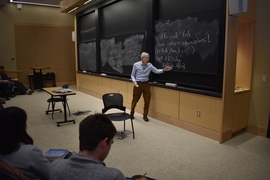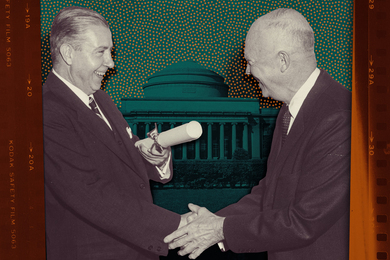Applied mathematics Professor Alan Edelman has been selected to receive the 2019 IEEE Computer Society Sidney Fernbach Award.
Edelman was cited “for outstanding breakthroughs in high performance computing, linear algebra, and computational science and for contributions to the Julia programming language.”
One of the IEEE Computer Society's highest honors, the Sidney Fernbach Award recognizes outstanding contributions in the application of high-performance computers (HPC) using innovative approaches.
Edelman works on numerical computation, linear algebra, random matrix theory, and geometry, and says that he loves algorithms, theorems, compilers, DSLs, and old-fashioned performance tuning. But a lifelong goal has been improving HPC research.
“Julia was invented to prove that HPCs’ biggest challenges could be solved with language,” says Edelman, who leads the Julia laboratory in the Computer Science and Artificial Intelligence Laboratory (CSAIL), and is chief scientist at Julia Computing. “Still, there is so much work to do.”
Edelman’s interest in HPC emerged shortly after he arrived at MIT in the 1980s to earn his doctorate in applied mathematics. He said he “learned many lost lessons moonlighting” at Thinking Machines, where he started thinking about how “breakthroughs in HPC could come from raising the levels of abstraction through high-level languages that are built from the ground up for performance and productivity.”
“HPC had missed out for too long on the key intellectual ingredient that would make all the difference: language. The ‘one true goal’ for HPC is the number of users. Performance, productivity, scalability, reproducibility, composability, and other obvious and non-obvious metrics are subsumed by this ‘prime directive.’”
Edelman, who came back to MIT as faculty in 1993, eventually teamed up with Jeff Bezanson PhD ’15, Stefan Karpinski, and Viral B. Shah to create a programming language that they called Julia. This language was designed to help researchers write high-level code in an intuitive syntax and produce code with the speed of production programming languages.
The free and open-source Julia 1.0 was released in 2018. Today, the Julia project has over 800 open source contributors, 2,000 registered packages, and over 10 million downloads. It is used in over 1,500 universities, including MIT, for solving difficult and large-scale problems in areas such as climate modeling, scientific machine learning, and medicine. Julia is also used by companies such as BlackRock, Capital One, Intel, Cisco, and Netflix, and by government agencies such as the Federal Aviation Administration, NASA, and the Federal Reserve Bank of New York.
The Julia creators received the 2019 James H. Wilkinson Prize for Numerical Software. In addition, Edelman has also received the Householder Prize, the Chauvenet Prize, and the Charles Babbage Prize.
Edelman will receive his award, which consists of a certificate and a $2,000 honorarium, on Nov. 19 at the Supercomputing 2019 Conference awards plenary session in Denver, Colorado.









